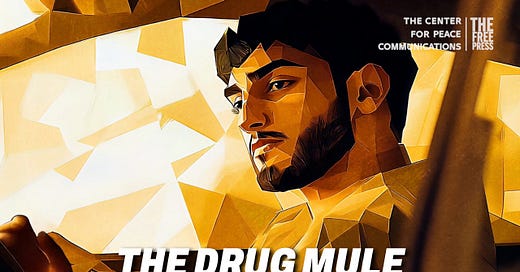A Hezbollah Drug Mule Tells His Story
A former smuggler for the terror group breaks his silence on behalf of countless Arab families shattered by the "jihadist drug" Captagon.
Hezbollah’s Hostages
When He Tried to Flee Hezbollah’s Clutches, They Abducted Six of His Relatives
To feed his family amid the hardships of civil war, a young Syrian man takes a job with Hezbollah as a courier. He soon discovers that the packages he is transporting contain the drug Captagon — and his associates have been slipping crushed tablets into his tea.
Debuting today, episode 3 of Hezbollah’s Hostages, a Center for Peace Communications production distributed by The Free Press, features the testimony of Hamza, the first drug mule in Hezbollah’s massive narcotics trade ever to speak out.
Click here to watch Hamza’s testimony in “The Drug Mule.”
Sometimes called “the jihadist drug,” Captagon is an addictive psychostimulant that dulls pain, induces euphoria, and—as the subject of today’s film explains—numbs the human conscience. It was widely used by ISIS fighters and found in the bodies of several perpetrators of Hamas’s October 7 massacre. It also serves as a major source of funding for jihadism.
According to the U.S. State Department, the Captagon trade spans 17 countries, from Italy to Malaysia. Hezbollah — together with the regime of Syria’s Bashar al-Assad — produces the vast majority of supply, and the terror group is responsible for smuggling and selling it across the globe. Iran’s so-called “Axis of Resistance” — including Hezbollah, Hamas, and the Houthis, all of whom act as proxies for Tehran — owes much of its war chest to these profits. Stemming the manufacture and supply of Captagon is nearly as consequential as sanctioning Iran itself.
Hamza, the young man in today’s video, was unwittingly drawn into the Captagon trade out of desperation to help feed his younger brothers. His harrowing account is one of both perpetrator and victim.
The drug’s victims also include broken families throughout the Middle East — a tragedy which has led several Arab governments to take aggressive measures against the trade. Jordan in particular has launched air strikes on its border with Syria, in towns in southeastern Syria, and on its border with Saudi Arabia over the past two years to interdict drug smugglers. Police and counter-narcotics units in the Gulf routinely seize large shipments of the drug.
Make a tax-deductible contribution to the Center for Peace Communications by clicking here:
Halting the Captagon trade was also one of the top conditions of Arab states for normalization of ties with Bashar al-Assad — though more than a year after the Arab League reinstated the regime as a member, Syria’s robust production and exportation of the pill has not slowed.
The devastating social impact of Captagon in the region begs greater government and non-government measures to combat it, as well as new efforts to bring countries together to address the problem. Now, with Hezbollah weakened after Israel’s weeks of momentous assault, a generational opportunity has emerged to galvanize Iran’s many opponents across the region in the service of such an effort — for the sake of defeating Hezbollah as well as protecting Arab families from the scourge of drugs. To realize the full potential of this opportunity, American leadership is urgently needed.



